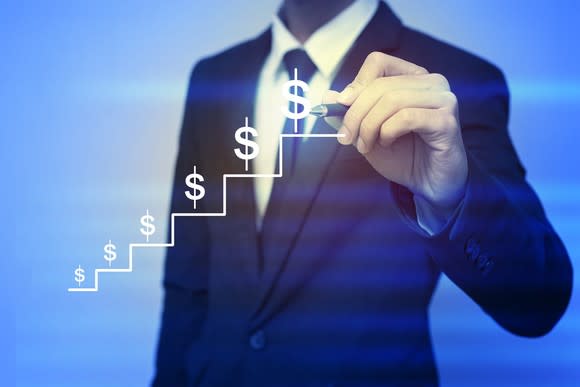3 Stocks That Could Put Tesla's Returns to Shame
Since going public in 2010, Tesla Inc (NASDAQ: TSLA) has been an incredible investment. Since, it's generated 1,300% in returns, meaning every $1,000 invested in the company's IPO would be worth an incredible $13,000 today. But while incredibly high expectations continue to have investors excited about Tesla's future prospects, those same expectations are heavily baked into the current stock price. The share price is actually down about 13% from the all-time high, reached late last year.
And while Tesla could remain a big winner, it's not the only stock investors who are looking for big returns should consider. Case in point: Three Motley Fool investors think Celldex Therapeutics, Inc. (NASDAQ: CLDX), Tencent Holdings Ltd (NASDAQOTH: TCEHY) (NASDAQOTH: TCTZF), and Starbucks Corporation (NASDAQ: SBUX) could very well make for far better investments than Tesla going forward.

Image source: Getty Images.
This comeback story has legs
George Budwell (Celldex Therapeutics): There aren't many stocks that can shine nearly as brightly as Tesla, but the clinical-stage biotech Celldex Therapeutics might have what it takes.
The backstory is that Celldex's stock has been in investors' proverbial doghouse ever since its experimental brain cancer vaccine, Rintega, failed in a late-stage study in 2016. In fact, the company's shares have lost 90% of their value from their former highs back in mid-2013 -- when Rintega first appeared to have a real shot at hitting the mark in a late-stage trial.
The odd part is that Celldex has never been a one-trick pony, and the company has even augmented its pipeline since Rintega's failure by acquiring Kolltan. The net result is that Celldex now sports six clinical candidates across a broad array of solid tumors. Celldex is also nearing a pivotal-stage readout for its antibody-drug conjugate, glembatumumab vedotin (glemba), in triple-negative breast cancer patients. So, the market's dire outlook is probably unwarranted at this point.

Image source: Getty Images.
Glemba, for instance, could easily generate upwards of $500 million in sales just as a niche breast cancer treatment. This respectable peak sales figure is more than double the company's present enterprise value of $170 million -- illustrating the extreme level of pessimism surrounding this clinical-stage biotech stock right now.
To be fair, cancer drugs in general do have an abysmal success rate in early to mid-stage trials, and Celldex isn't that far removed from Rintega's failure, either. So, there's a good reason this stock is currently being valued at only a small fraction of the commercial opportunity presented by its broad pipeline.
If glemba pans out, though, this speculative biotech stock could be a big winner for early shareholders. And that's why growth-hungry investors may want to consider buying a few shares before glemba's breast cancer trial reads out within the next six to eight weeks. That said, glemba could turn out to be yet another dead end for the company, suggesting that investors shouldn't buy more than they can afford to lose.
A part-owner in Tesla that could grow even stronger
Brian Stoffel (Tencent): Here's an interesting tid-bit: The company that I think could put Tesla's returns to shame will actually benefit if I'm wrong. That's because Chinese social media giant Tencent already has a 5% stake in Tesla. Investments like this are just one of the unique aspects that get me excited about Tencent's future.

Image source: Getty Images.
To understand the bread and butter of Tencent's business, you have to know that it has two mammoth offerings: gaming, and a one-stop-shop mobile app that's uber popular in China. On the gaming side, Tencent is the world's largest provider -- offering Honor of Kings and League of Legends. The division has seen sales grow at a 30% clip annually since 2014.
On the social media side, Tencent got its start with QQ, a messaging app similar to AOL Instant Messenger. But it really scored a coup with WeChat -- which is a messaging, blogging, ride-hailing, social-media, e-commerce app all rolled into one. The social media unit has also seen amazing growth, with sales increasing by 40% per year since 2014.
These businesses bring in lots of cash, which the company then redeploys to invest in both major international companies like Tesla and Activision Blizzard (NASDAQ: ATVI), but also several smaller start-ups in China. That kind of financial flexibility is something Tesla investors could only dream of, and it's why I think Tencent -- despite its size -- will offer huge gains for shareholders moving forward.
Its next growth phase could be its biggest
Jason Hall (Starbucks): It may sound crazy to think that Starbucks -- a company that's already been one of the most successful growth stocks ever -- could possibly out-perform Tesla going forward. Especially with Starbucks' growth having slowed recently, while Tesla is still very early in its own story.
However, to draw that conclusion potentially ignores Starbucks' future prospects. Sure, its sales in the U.S. aren't likely to grow at double-digit rates going forward, but we live in a very, very big world that's getting more populous and more wealthy. The global middle class is growing at an enormous rate, with expectations that it will increase by about 1 billion people in less than two decades. That's a lot of prospective new Starbucks customers.

Image source: Starbucks.
China in particular is a huge prospective market. Its China/Asia Pacific segment generates about one-fifth as much revenue and operating income as the Americas segment, but management expects China to eventually supplant the U.S. as Starbucks' biggest market. With a middle class on track to top 500 million people in only a few years, the idea isn't as preposterous as it may sound. Think about that: A bigger market than the U.S. that the company has only started to tap.
Furthermore, Starbucks is a cheap stock today, trading for around 17 times company guidance for 2018 earnings after recent weakness in the U.S. has pushed its stock price down. Tesla, on the other hand, is expensive by just about every valuation metric, burning through cash, and far from profits as it spends heavily to expand.
Add it up, and Starbucks has a pretty low bar to be an outperforming investment, while high expectations and a much weaker balance sheet mean Tesla has little margin for error. I own both, but Starbucks is the better, safer bet.
More From The Motley Fool
Brian Stoffel owns shares of Tencent Holdings and Tesla. George Budwell has no position in any of the stocks mentioned. Jason Hall owns shares of Activision Blizzard, Starbucks, and Tesla. The Motley Fool owns shares of and recommends Activision Blizzard, Starbucks, Tencent Holdings, and Tesla. The Motley Fool recommends Celldex Therapeutics. The Motley Fool has a disclosure policy.

 Yahoo Finance
Yahoo Finance 